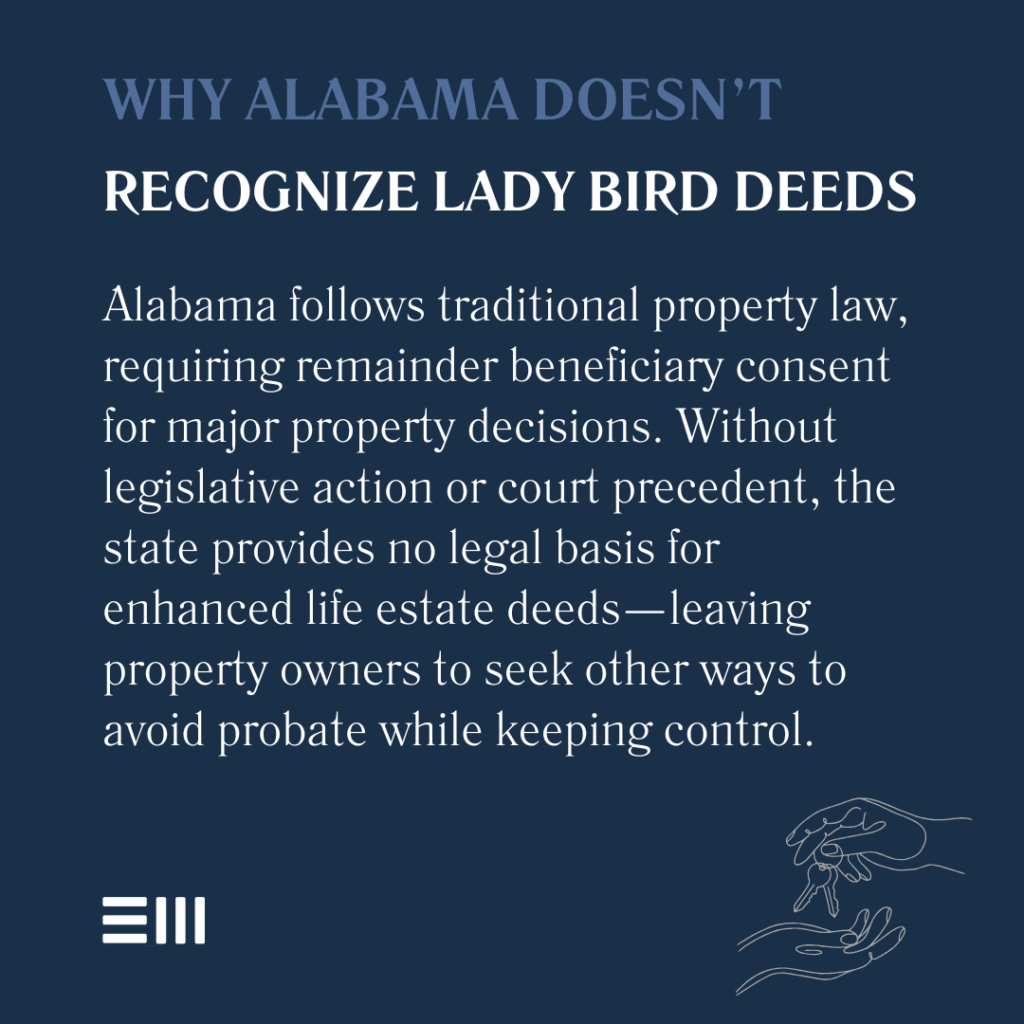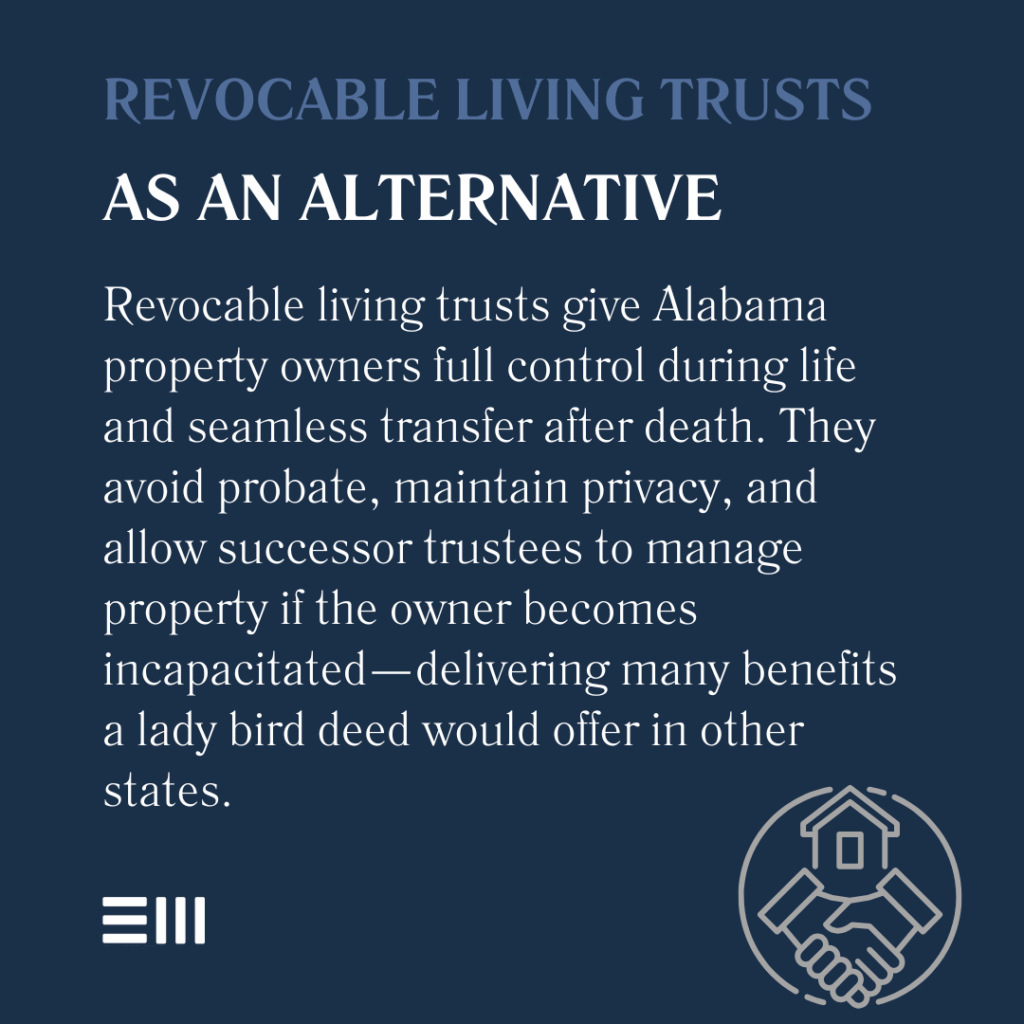
Many Alabama residents search for information about Lady Bird deeds, only to discover a frustrating reality: while neighboring states like Florida and Texas embrace this estate planning tool, Alabama law provides no statutory recognition for these enhanced life estate deeds.
This legal gap leaves thousands of property owners seeking alternatives to avoid probate while maintaining control of their homes during their lifetime.
What Is a Lady Bird Deed?
A Lady Bird deed, also known as an enhanced life estate deed, represents a unique estate planning instrument that allows property owners to retain complete control during their lifetime while automatically transferring ownership upon death.
Understanding this concept helps Alabama residents appreciate what they’re missing and why alternatives become necessary.
The deed gets its colorful name from President Lyndon B. Johnson, who allegedly used this type of deed to transfer property to his wife, Lady Bird Johnson.
While this origin story may be more legend than fact, the name has stuck in legal circles. These deeds function by creating a life estate with enhanced powers, allowing the grantor to sell, mortgage, or otherwise dispose of the property without consent from the remainder beneficiaries.
Upon the grantor’s death, the property automatically transfers to designated beneficiaries without probate proceedings.
This powerful tool combines the benefits of retained control with streamlined transfer, making it highly attractive in states where it’s recognized.
Why Alabama Doesn’t Recognize Lady Bird Deeds
Alabama’s non-recognition of Lady Bird deeds stems from the state’s adherence to traditional common law property principles and the absence of specific statutory authorization.
The state legislature has not enacted laws validating these enhanced life estate arrangements, leaving property owners without this convenient option.
Several factors contribute to Alabama’s position:
- Traditional property law: Alabama follows conventional life estate rules requiring remainder beneficiary consent for major decisions.
- Legislative inaction: No bills have successfully created statutory framework for enhanced life estates.
- Title insurance concerns: Without clear legal authority, title companies hesitate to insure these transfers.
- Court precedent: Alabama courts haven’t validated enhanced life estate deeds through case law.
This legal landscape forces Alabama residents to explore alternative methods for achieving similar estate planning goals.

Alternative Estate Planning Options in Alabama
While Lady Bird Deed recognition in Alabama remains absent, several effective alternatives can accomplish similar objectives. These options provide varying degrees of control, probate avoidance, and transfer efficiency for property owners.
#1: Revocable Living Trusts
Revocable living trusts offer the most comprehensive alternative to Lady Bird deeds in Alabama.
These flexible instruments allow property owners to maintain complete control while alive and ensure a smooth transfer upon death.
- Full control retained: Trustors can modify, revoke, or terminate trusts at any time.
- Probate avoidance: Trust property transfers directly to beneficiaries without court involvement.
- Privacy protection: Trust terms remain private, unlike probated wills becoming public record.
- Incapacity planning: Successor trustees can manage property if trustor becomes incapacitated.
Creating and funding a revocable living trust requires more initial effort than a Lady Bird deed would, but provides similar benefits under Alabama law.

#2: Life Estates with Powers
Traditional life estates can be enhanced through careful drafting to approximate Lady Bird deed benefits. While not identical, properly structured life estates provide significant flexibility.
- Specific powers included: Deed language can grant selling or mortgaging authority.
- Remainder protection: Some beneficiary rights remain despite enhanced powers.
- Court interpretation: Unclear provisions may require judicial determination.
- Title complexity: Buyers may hesitate without clear remainder beneficiary consent.
Working with experienced attorneys ensures maximum flexibility within Alabama’s legal framework.
Comparison with Neighboring States
Understanding how neighboring states handle Lady Bird deeds highlights Alabama’s unique position and helps residents appreciate available alternatives. This regional perspective provides context for Alabama’s estate planning landscape.
Florida recognizes Lady Bird deeds through common law acceptance and widespread use. Texas provides statutory support for enhanced life estate deeds. Mississippi allows these instruments through judicial recognition.
Georgia, like Alabama, doesn’t recognize Lady Bird deeds, requiring similar alternatives.
This patchwork of state laws creates confusion for property owners with holdings across state lines and emphasizes the importance of state-specific planning.
Common Misconceptions About Lady Bird Deeds in Alabama
Misunderstandings about the availability of the Lady Bird deed in Alabama persist despite clear legal limitations.
Addressing these misconceptions helps property owners make informed decisions about appropriate alternatives.
- Online templates: Generic forms from other states won’t create valid Alabama Lady Bird deeds.
- Notarization beliefs: No amount of notarization makes these deeds legally effective in Alabama.
- Recording assumptions: County recording doesn’t validate legally insufficient instruments.
- Future recognition: Current law provides no indication of pending Lady Bird deed authorization.
- Partial effectiveness: These deeds don’t function as regular life estates when enhanced powers fail.
Recognizing these realities prevents wasted effort and potential legal complications from attempting invalid transfers.
Frequently Asked Questions About Lady Bird Deeds in Alabama
Property owners frequently have questions about Lady Bird deed restrictions in Alabama and available alternatives.
These answers address the most common concerns and guide decision-making.
Can I Create a Lady Bird Deed if I Own Property in Both Alabama and Florida?
Property located in Florida can utilize a Lady Bird deed under Florida law, while Alabama property requires alternative planning methods.
Each state’s law governs property within its borders, necessitating different instruments for multi-state holdings. Coordinate strategies across states to ensure consistent estate planning goals.
What Happens if I Execute a Lady Bird Deed for Alabama Property?
Recording a Lady Bird deed for Alabama property creates an ambiguous situation, potentially resulting in standard life estate treatment or complete invalidity.
Title companies likely won’t insure transfers based on these deeds, and beneficiaries may face litigation to establish ownership rights. Courts might need to interpret the attempted transfer’s legal effect.
How Much More Does a Revocable Trust Cost Than a Lady Bird Deed Would?
Revocable living trusts typically require a higher initial investment than simple deed preparation, including attorney fees for trust drafting and property transfer documentation.
However, trusts often provide greater long-term value through comprehensive estate planning beyond just real estate. Consider total estate planning needs when evaluating cost differences.
Can the Alabama Legislature Authorize Lady Bird Deeds in the Future?
Legislative authorization remains possible but requires successful bill passage through Alabama’s political process. No current legislation appears to be actively pursuing Lady Bird deed recognition. Property owners should plan using existing tools rather than waiting for potential future changes.
Which Alternative Best Replaces a Lady Bird Deed for My Situation?
The optimal alternative depends on specific circumstances, including family dynamics, property value, tax considerations, and control preferences. Revocable trusts offer the most similar benefits but require more complexity.
Consultation with qualified attorneys helps determine the most appropriate strategy for individual needs.
Secure Your Property’s Future with Proven Alabama Solutions
Don’t let the absence of Lady Bird deeds in Alabama derail your estate planning goals.
Our experienced estate planning attorneys here at Baxley Maniscalco understand the frustration of limited options and excel at crafting creative solutions using Alabama’s available tools.
We’ll analyze your unique situation, explain each alternative’s benefits and limitations, and implement the strategy that best protects your property while maintaining your desired control.
Whether through sophisticated trust arrangements or simpler deed alternatives, we ensure your property transfers according to your wishes without unnecessary probate complications.
Contact us today to schedule your consultation and discover how Alabama’s existing estate planning options can achieve your property transfer objectives.
Can't find what you're looking for? Search our site below.










